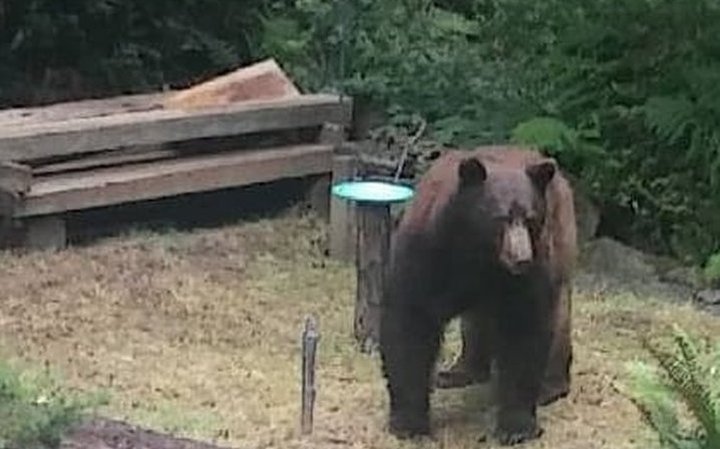
A black bear spotted in a Eureka resident’s backyard. | Video provided by Wendy Pickett of Willow in the Wood.
Animal Welfare Institute press release:
In response to advocacy by a coalition of animal protection and conservation groups, Humboldt County today unanimously approved a new contract with the federal wildlife-killing program, Wildlife Services, that will result in far fewer native species being killed. The contract requires that Wildlife Services implement numerous reforms to reduce its killing of wildlife involved in conflicts, by, among other reforms, prioritizing nonlethal mitigation measures in urban and suburban areas and prohibiting killing of beavers.
Advocates began working with county officials after notifying the county in a letter that its existing contract with Wildlife Services violated state law by allowing the use of lethal methods without considering their impacts to the environment.
“It is vital that every government agency — from local to the federal level — follow the law for the protection of wildlife,” said Animal Legal Defense Fund Executive Director Stephen Wells. “We will continue to ensure laws that protect animals are followed and enforced.”
Under the modified contract, Wildlife Services cannot kill animals in urban or suburban areas of the county until after implementation of “all feasible non-lethal mitigation measures.” The new contract also imposes reporting requirements and restricts cruel or ecologically harmful killing methods, such as pesticides, lead ammunition, and body-gripping traps.
Humboldt is the most recent California county the coalition called upon to reform its wildlife management program. Shasta, Siskiyou, Monterey, Sonoma, and Mendocino counties have all terminated, suspended, or considered the environmental effects of their contracts — either voluntarily or by court order — after the coalition and others took or threatened legal action.
“We are glad to see Humboldt County acknowledging science and recognizing that indiscriminate wildlife killing is neither effective nor humane management,” said Bethany Cotton, terrestrial wildlife director for the Animal Welfare Institute. “We look forward to a future where nonlethal coexistence tools are the norm across California and nationwide.”
“Coexistence with our wild lands and the animals that inhabitant them is not just possible but imperative to ecosystem balance,” said Debra Chase, CEO of the Mountain Lion Foundation. “We commend the county for taking this action.”
For nearly a decade, Humboldt County has employed Wildlife Services to kill hundreds of native animals under contract with Wildlife Services. Data from that federal wildlife-killing program shows that in the period from 2008 to 2017 in Humboldt county alone Wildlife Services killed at least 178 coyotes, 54 black bears, 43 gray foxes, 23 mountain lions, 483 raccoons, 880 skunks, and 112 opossums — overwhelmingly on behalf of the livestock industry.
“Humboldt County’s wildlife can rest a little safer because of today’s agreement,” said Tom Wheeler, executive director of the Arcata-based Environmental Protection Information Center. “EPIC would like to particularly thank Agriculture Commissioner Jeff Dolf and the Board of Supervisors for recognizing that most human-wildlife conflicts are preventable and for working with the coalition to reduce unnecessary killing of wildlife.”
“We’re grateful that Humboldt County has taken this step towards more humane and effective management of its wildlife,” said Collette Adkins, carnivore conservation director at the Center for Biological Diversity. “I’m hopeful that the days of Wildlife Services’ indiscriminate and cruel killing of California’s wildlife are coming to an end.”
“Marin County led the way by ending its contract with Wildlife Services in 2000 and adopting a nonlethal cost-share program in place of lethal control,” said Camilla Fox, executive director of Marin-based Project Coyote. “We are so pleased to see other counties in California — and beyond — now considering alternatives to killing.”
“Even though Wildlife Services has multiple nonlethal methods at its disposal, this federal program has — for far too long — been given carte blanche by local governments to kill wildlife rather than find other solutions to mitigate human-wildlife conflict,” said Lindsay Larris, wildlife program director of WildEarth Guardians. “We are pleased that Humboldt County is taking a step towards coexistence in holding Wildlife Services to a higher standard of conduct that we hope to see emulated across the American West.”
The coalition includes the Animal Legal Defense Fund, Animal Welfare Institute, Center for Biological Diversity, Environmental Protection Information Center, Mountain Lion Foundation, Project Coyote, and WildEarth Guardians.
CLICK TO MANAGE